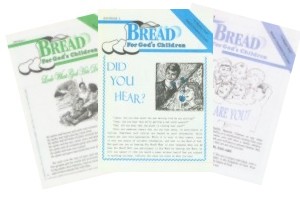
From Kim Griswell, Coordinating Editor
Travel and Adventure
Articles that feature adventurous travel. Not the "family vacation" kind of thing, unless your family goes to study turtles in the Galápagos Islands, as does the author of "Stars and Sea Lions" (June 2006). We prefer articles that feature kids in some way. Publishable-quality photos are almost essential for these kinds of articles, since it would be difficult (or impossible) for us to acquire photos if the writer couldn't provide them. Please remember that even travel and adventure articles need a focus—not simply "We went here and did this," but something that reveals the meaning behind the travel or the reason for the adventure, etc. 750 words maximum.
From Marileta Robinson, Senior Editor
Fiction for Young Readers
We need fun, lively stories as well as quiet, thoughtful stories for young readers at first- and second-grade reading levels. I would like to see more stories with boy appeal, like "Training Wheels" in September 2005 and "Fox and His Halloween Tail" in October 2005. 500 words maximum.
From Carolyn Yoder, Senior Editor
World Cultures
• Intimate looks at other peoples and their traditions—particularly in northern and southern Africa, Asia (other than India), Europe, Canada, the Caribbean, and the Pacific (articles on children)
• Holidays—first person
U.S. History
• Modern history (20th century), particularly the Civil Rights movement
• Holidays, particularly Christmas and Thanksgiving
• Articles that touch on the diversity of people in the United States
• Biographies of U.S. subjects as children
• Anecdotal articles on George Washington and Abraham Lincoln
• Articles on patriotic themes
• HUMOROUS articles on U.S. history (review back issues for articles on Lincoln and humor, Washington and his teeth, Jefferson getting his life mask, and Ben Franklin and his love of exercise)
From Judy Burke, Associate Editor
Sports
We're interested in sports articles that focus either on a known athlete (a squeaky-clean one), on the development of specific skills (for example, fielding a grounder), or on the challenges faced by athletes of any kind (for example, being smaller than your teammates). Successful articles often include quotes gained from personal interviews with athletes or experts and useful tips for
readers who play that sport. 800 words maximum.
From Andy Boyles, Science Editor
Science and Nature Articles
Our guidelines state that our word limit is 800, but articles that are even shorter (350–400 words) are especially welcome as possible one-page features. We put a high value on articles that show science as a process—articles that follow a scientist or group of scientists as they try to solve one of nature's mysteries.
We are always looking for science articles about animals that are of high interest to kids. An article might follow researchers who study such animals. The article may tell the adventures of only one day, but information about the animals and the research will arise naturally in the course of the action, so our readers will learn something about both.
We currently have enough articles about birds, reptiles and amphibians, insects (especially bees), and volcanoes.
From Joëlle Dujardin Kirkland, Associate Editor
Crafts: Crafts with boy-appeal, games, holiday crafts, and crafts from other cultures (with background included)
Younger Nonfiction: First-person accounts of fieldwork; arts stories; biographies with interesting slants; kids living in other cultures; ancient history; animals; details from urban life (workers, transportation, etc.). These stories should have a clear focus and should be written at a first- or second-grade reading level. 450 words or fewer.
Gallant Kids: Leads (or articles) on kids under thirteen years old doing service in their communities. 350 words
From Linda Rose, Assistant Editor
Full-Page Puzzle Activities
On the inside-back cover, we like to take advantage of the cover-stock surface by using a large illustration or incorporating photos in the puzzle. Often, this is the page on which we can do several activities within one (for example, using one illustration for a number of activities). Submissions to this area ideally include detailed art directions/notes, as well as succinct and easily understood activity directions for the reader. (Artwork or photos do not need to be submitted with the manuscript.)
Careers Articles
We are always in the market for fresh and interesting articles that take an in-depth look at a career. Our hope is that a career profile will provide kids with information that they cannot easily get elsewhere, such as in a typical "careers" book or in an encyclopedia. Instead, we want our career pieces to be intriguing reads that just happen to be about a person's career.
As our guidelines point out, "We prefer biographies that are rich in anecdotes." Substantive and "insider" anecdotes are often critical to the success of these articles; we want kids to feel that they are getting a "behind the scenes" or inside glimpse into the subject.
Focusing on one individual (or, in some cases, a few) often helps to make the manuscript feel more personal. Career pieces that focus on a person within a career tend to be more appealing. We prefer research based on firsthand experience, consultation with experts, or primary
sources.
From George Brown, Assistant Editor
Short Activities
We're looking for short puzzles, activities, teasers, and interesting tidbits to go on our mixed pages—those four or five pages per issue with a variety of short activities. These activities, which can be almost anything, have to be powerful to pull readers into the magazine. However, we do not publish word searches, crossword puzzles, or fill-in-the-blank activities.
Highlights recommends reviewing the magazine's submission guidelines, available at www.highlights.com, found in the About Us section. Back issues can be found at most local libraries. Please send submissions to the specific editor listed above, or
Manuscript Coordinator
Highlights for Children
803 Church Street
Honesdale, PA 18431

















.jpg)
